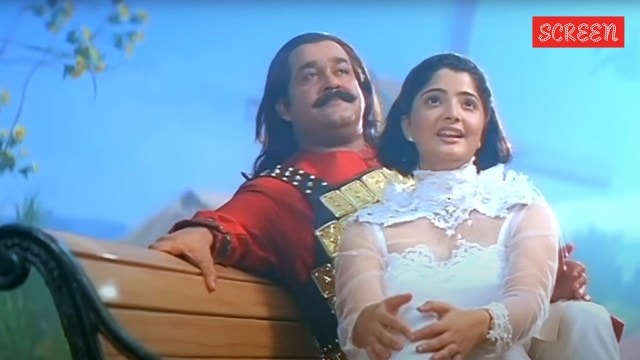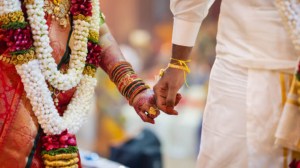Click here to follow Screen Digital on YouTube and stay updated with the latest from the world of cinema.
Mohanlal’s heroine in Ravanaprabhu and singer of hit Shah Rukh Khan tracks, where is Vasundhara Das now?
As fans celebrate the re-release of Mohanlal's Ravanaprabhu, movie lovers have been wondering, where is the film's female lead, Vasundhara Das, now?
 Mohanlal and Vasundhara Das in Ravanaprabhu. (Screenshot: YouTube/MalayalamCassettes)
Mohanlal and Vasundhara Das in Ravanaprabhu. (Screenshot: YouTube/MalayalamCassettes)After a series of disappointments over the past few years, during which he delivered one dud after another, Malayalam superstar Mohanlal made a majestic comeback earlier this year, proving once again that there’s no bigger crowd-puller in the industry than him. Although not all his releases opened to rave reviews, all the films in which he appeared in lead roles this year emerged as blockbusters, with L2: Empuraan and Thudarum entering the top five in the list of highest-grossing Malayalam films of all time.
Amid a flurry of new films, one of his most cherished blockbuster actioners, director Ranjith’s Ravanaprabhu (2001), has returned to theatres, taking audiences, particularly his die-hard fans, on a nostalgic trip. As fans celebrate the return of Mangalassery Neelakandan and Karthikeyan (the dual roles Mohanlal played in the movie) after 24 years — a restored 4K version of the film with Dolby Atmos sound has hit the screens — movie lovers in Kerala have been wondering, where is the film’s female lead, Vasundhara Das (who played Janaki), now? Although she did not have a long or strong career in Malayalam cinema, and her subsequent appearance in the Mammootty-starrer Vajram (2004) went unnoticed, Vasundhara is still remembered for her role in Ravanaprabhu, particularly due to the film’s lasting impact on the Malayali psyche.
While she is known among Malayalees as Dr Janaki Nambiar, the only daughter of Mundakkal Shekharan (Napoleon) — one of the most iconic antagonists in the industry’s history — in other parts of the country, particularly in the Hindi, Tamil and Telugu markets, she is renowned as an exceptional playback singer who has gifted them many memorable tracks. From composer AR Rahman’s “Shakalaka Baby” (Mudhalvan), “Ayyo Pathikichu” (Rhythm), “O Rey Chhori” (Lagaan) and “Sarigame” (Boys), Deva’s “Kattipudi Kattipudida” (Kushi), Shankar–Ehsaan–Loy’s “It’s The Time To Disco” (Kal Ho Naa Ho) and “Where’s The Party Tonight?” (Kabhi Alvida Naa Kehna) and Yuvan Shankar Raja’s “Thathai Thathai” (Manmadhan), to Anu Malik’s “Chale Jaise Hawaien” (Main Hoon Na), Pritam’s “Salaame” (Dhoom), Harris Jayaraj’s “Kannum Kannum” (Anniyan), and GV Prakash Kumar’s “Chakori” (Ullasamga Utsahamga), Vasundhara Das has given her vocals to several chartbusters.
Nonetheless, she hasn’t been active in movies for over a decade now. Even as an actor, her appearances were limited, but the roles she chose were notable. Besides Ravanaprabhu, she also played key roles in movies like Kamal Haasan’s Hey Ram (2000), Mira Nair’s Monsoon Wedding (2001), Ajith Kumar’s Citizen (2001), Darshan’s Lankesh Patrike (2003) and Rekha’s Kudiyon Ka Hai Zamana (2006). Ahead of the re-release of Ravanaprabhu, she returned to the public eye once again, expressing her elation at the movie finding enthusiasts even after two decades.
Watch SCREEN’s exclusive interview with Ravi K Chandran here:
In conversation with Matinee Now, she opened up about her current life and the creative endeavours she is part of. “Performances have been a mainstay for me. I continue to perform with musicians and my band. I do concerts all around the world. These days I have the time to explore different genres of music, which I always wanted to but didn’t have enough time for earlier.”
Opening up about the activities of her organisation, Drumjam, Vasundhara revealed that she and her husband (drummer Roberto Narain) established it in 2005-06. “It uses music as a medium for corporate training. We use rhythm and voice to bring experiences to people in the context of team building, leadership and training.”
Revealing that they subsequently established a foundation to offer similar services to people from various walks of life, she said, “We use music as a medium for more than just entertainment. Music can be a shortcut to mindfulness and meditation. It’s not therapy per se, but it can be therapeutic. I am a singer, songwriter and composer, and also use music as a medium for communication, collaboration and leadership. I also use music as a medium for self-healing and sound healing. I play some instruments like the Native American flute. We try to help people deal with stress, anxieties, maladies and so many different situations that they may find themselves in, and how to use rhythm to communicate and connect with people in today’s isolating and digital world.”


- 01
- 02
- 03
- 04
- 05
































